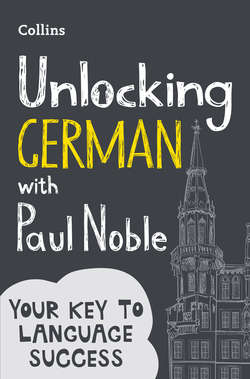Читать книгу Unlocking German with Paul Noble: Your key to language success with the bestselling language coach - Paul Noble - Страница 9
ОглавлениеCHAPTER 3
I bought the ticket but I didn’t see the film.
“I bought the ticket but I didn’t see the film.”
It’s the sort of sentence that you might say in a conversation in English without even thinking about it, but how do we put it together in German? And what lessons will we learn along the way?
Let’s find out!
Once again, how would you say “I would like to drink it”?
Ich möchte es trinken.
(ikh murkh-ter es trink-urn)
“The milk” in German is:
die Milch
(dee milkh)
So how would you say “I would like to drink the milk”?
Ich möchte die Milch trinken.
(ikh murkh-ter dee milkh trink-urn)
“The beer” in German is:
das Bier
(das bee-er)
So how would you say “I would like to drink the beer”?
Ich möchte das Bier trinken.
(ikh murkh-ter das bee-er trink-urn)
“Is” in German is:
ist
(ist)
So, how would you say “the beer is…”?
Das Bier ist…
(das bee-er ist)
“Good” in German is:
gut
(goot)
So how would you say “the beer is good”?
Das Bier ist gut.
(das bee-er ist goot)
And how would you say “the milk is good”?
Die Milch ist gut.
(dee milkh ist goot)
Notice how there is more than one word for “the” in German. “The milk” is die Milch whereas “the beer” is das Bier.
“The wine” in German is:
der Wein
(dair vine)
So how would you say “the wine is good”?
Der Wein ist gut.
(dair vine ist goot)
So, here we have our third word for “the” in German: “der”.
Three words for “the”?
How strange! Three words for “the”? Seriously?Why on earth would anyone want that?
Well, yes, it does seem odd to us as English speakers that a language would have more than one word for “the”. I mean, what’s the point?
Well, to tell you the truth, there really isn’t one; it’s just a simple reality that we must learn to deal with.
In German, things are classed as either “masculine”, “feminine” or “neuter” and the words used for “the” vary according to which of these categories a word belongs to – “der” is used with masculine words, “die” is used with feminine words, and “das” is used with neuter / neutral words.
You could say, of course, that in English we also give things genders – after all, we refer to men and boys as “he”, women and girls as “she”, and things without any particular gender as “it”.
The difference with German though is that it gives genders to everything (not just people as in English) and then it uses a different word for “the” to let you know which gender that word is.
So, in German, a man is masculine, yes – but then so is wine. And a woman is feminine, yes – but then so is milk. And of course, beer, as we saw above, is considered (for goodness knows what reason) to be neuter / neutral.
Strange, eh?
Anyway, the secret to dealing with this whole gender business is simply not to waste your time thinking about it! Instead, you will rapidly find that the more you use the language, the more you will know what gender any given word is essentially by instinct. Simply put, using the correct gender will just begin to “sound right”. So, as with everything else in this book, all you need to do is to relax and go with the flow – and don’t try to memorise anything! Instead, work your way through each chapter and trust in the fact that the content has been organised in such a way that you will pick up the genders of words naturally, along with everything else!
Now there is actually a very specific reason why I’m bothering to teach you about milk and beer and wine, as well as about the fact that there are genders in German and also about how there’s more than one word for “the” in German. Yes, there is a reason, I promise! Indeed, there is actually something very important that you need to learn in German that this precise set of drinks (beer, wine and milk) is going to teach you – right now in fact!
First, let’s begin with the feminine word “milk”. Remind me again, how would you say “the milk is good”?
Die Milch ist gut.
(dee milkh ist goot)
And how would you say “I would like to drink the milk”?
Ich möchte die Milch trinken.
(ikh murkh-ter dee milkh trink-urn)
Well, that was simple, wasn’t it? Now let’s try a similar sentence but using the neuter word “beer” instead.
So, how would you say “the beer is good”?
Das Bier ist gut.
(das bee-er ist goot)
